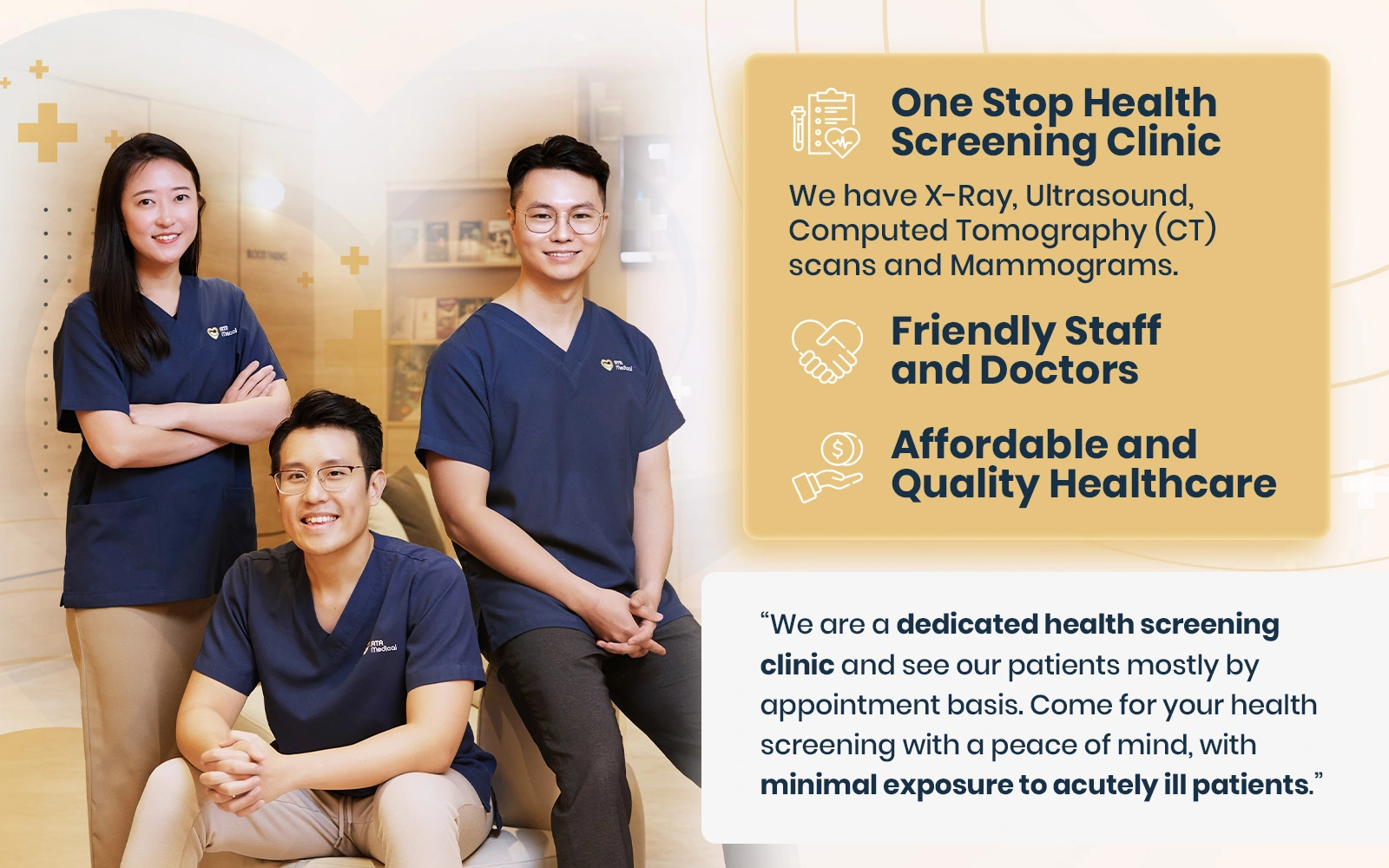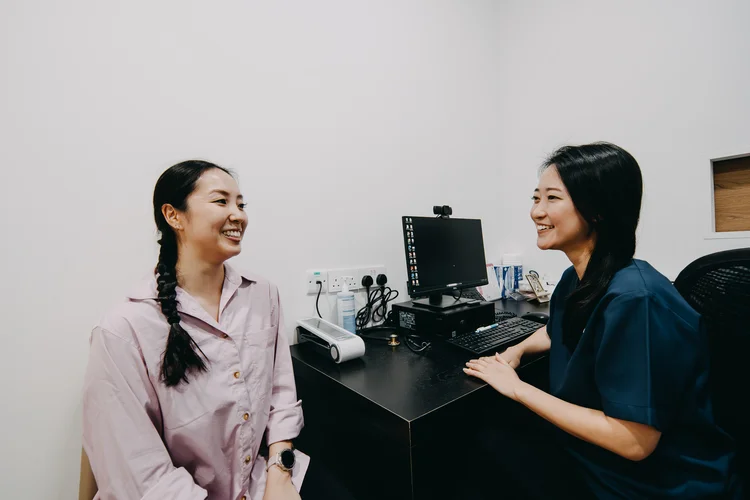How Is an STD Test Conducted?
Sexually transmitted disease (STD) tests are typically conducted using blood tests, urine tests, or swabs from the genital or throat areas. Testing is available at public health institutions, private clinics, and STD clinics regulated by the Ministry of Health (MOH). In Singapore, young adults are especially at risk of STDs, as they had the highest incidence rates according to a 2017 Ministry of Health report. Since many infections can be asymptomatic or lifelong, early detection through routine testing is essential for prompt treatment and preventing further transmission, and maintaining sexual health.


Common STD Tests
Most STDs, whether active (symptomatic) or dormant (asymptomatic), can be detected through blood, urine, or swab testing:
Blood Tests
Blood tests identify the presence of antibodies, antigens, or viral/bacterial DNA/RNA,
depending on the infection. These tests are used to detect both current and, in some
cases, past infections. For some diseases like hepatitis B, blood tests can distinguish
between active and resolved infections, making them a vital tool for diagnosis and
monitoring.
Common STDs detected through swab tests include chlamydia,
gonorrhea, and herpes. HPV testing usually
requires specific Pap smears or HPV DNA tests.

Urine Tests
Urine tests detect the DNA of bacteria causing the infection. The urine sample is
analysed using Nucleic Acid Amplification Tests
(NAATs), which amplify the genetic material of the bacteria for accurate
detection.
Common STDs detected through urine tests include chlamydia and gonorrhoea.

Swab Tests
Swab tests collect samples from specific body parts, such as the cervix, urethra, rectum,
throat, or sores, to detect the presence of bacteria or viruses. These samples are analysed
using various methods, including NAATs and viral cultures.
Common STDs detected through swab tests include chlamydia and gonorrhoea, herpes, HPV.
Oral Fluid Tests
Oral fluid tests involve collecting saliva samples, which are then tested for antigens or
antibodies, indicating the presence of an STD.
Common STDs tested for through oral fluid tests include HIV.
Multiplex PCR
Multiplex PCR (Polymerase Chain Reaction) is a testing method that can simultaneously detect
multiple STDs from a single sample, whether it's blood, urine, or a swab. This method is highly
accurate and is especially useful for comprehensive screening in individuals at higher risk of
multiple infections. Multiplex PCR can save time and resources compared to performing individual
tests for each STD.
Since different STDs have varying window periods for testing, it
is recommended to consult your doctor to determine the most appropriate testing approach for
your needs.
The Testing Procedure
The typical procedure for an STD test at a clinic typically involves:
- Consultation: The doctor will discuss your symptoms, sexual history, and any specific concerns you might have. Consultations are strictly confidential and private.
- Sample Collection: Depending on the type of test, samples may be collected through blood, urine, or swabs from the genital area, throat, or rectum.
- Laboratory Analysis: The collected samples are sent to a laboratory for analysis.
- Results: Results are usually available within a few days, depending on the specific tests conducted.

What to Expect During Your Visit
At healthscreening.sg, we strive to provide a professional, non-judgmental, and confidential environment for your STD testing needs. Our doctors and staff are trained to handle sensitive matters with care and discretion, ensuring your comfort throughout the process. We adhere to strict protocols, including secure electronic health record systems and discreet communication methods, to safeguard your personal information and test results at every step of the testing process and beyond.

Post-Test Counselling
Post-test counselling is a critical component of the STD testing process. Your doctor will thoroughly explain your test results, address any questions you may have, and provide support if needed. They will guide you on the next steps, including treatment and prevention strategies such as practising safe sex and scheduling regular testing. Although STD tests are highly accurate, there's still a slight chance of a false positive, where the test indicates an infection that isn’t actually present. If this is a concern, your doctor may recommend more precise confirmatory testing.

Summary
Regular STD testing is vital for protecting your sexual health and the well-being of your loved ones. Understanding the testing process helps you make informed decisions and take proactive steps, such as practising safe sex, to prevent the spread of infections. Take charge of your sexual health by scheduling an appointment with a doctor to discuss your testing needs today.
Why Choose Us?








Navigate Easy With Google Maps
Health Screening Singapore (Anson House)
Nearest MRT: EW15 Tanjong PagarHealth Screening Singapore (Camden Medical Centre)
Nearest MRT: TE13 Orchard BoulevardHealth Screening Singapore (CPF Jurong Building)
Nearest MRT: NS1/EW24 Jurong EastFrequently Asked Questions (FAQ)
STD tests can be carried out through blood tests, urine tests, and swab tests.
Most STD tests involve minimal discomfort and are generally not painful.
STDs are diagnosed by analysing blood, urine, or swab samples collected during a visit to a doctor. At healthscreening.sg, we offer tests for individual STDs as well as comprehensive packages to screen for multiple infections simultaneously.
You can undergo STD testing at public health institutions, private clinics, or clinics regulated by the Ministry of Health (MOH) in Singapore. At healthscreening.sg, we provide tests for specific STDs and comprehensive screening packages that detect multiple infections at once.
Yes, urine tests are effective in detecting certain STDs, such as chlamydia and gonorrhoea.
Some STDs may present symptoms like unusual vaginal discharge, itching, or sores. However, these symptoms can vary, and testing is the most reliable way to confirm an STD.
No. STD tests are conducted in a professional and discreet manner, ensuring patient comfort and privacy. At healthscreening.sg, we prioritise creating a safe and non-judgmental environment. For your comfort, you can request either a male or female doctor to assist you during the testing process.
HIV, herpes, and hepatitis B are currently incurable but can be effectively managed with appropriate treatment. HPV often clears on its own in most cases; however, certain high-risk strains can lead to long-term complications such as cervical cancer, other genital cancers, or throat cancer if left untreated.
For urine tests, avoid urinating for at least an hour before the test. Always follow any specific instructions from your doctor, such as dietary or medication restrictions.
Doctors typically diagnose STDs by reviewing your symptoms, conducting a physical examination, and collecting blood, urine, or swab samples for laboratory testing. At healthscreening.sg, we offer tailored tests for individual STDs as well as comprehensive screening packages to check for multiple infections simultaneously.
It is advisable to get tested after each new sexual partner, particularly if either of you has risk factors for STDs.
The detection window for STDs varies: HIV can typically be detected within 2-4 weeks using 4th-generation tests, chlamydia and gonorrhea within 1-6 days, syphilis in 3-6 weeks, and herpes in 4-6 weeks.
The cost of STD testing in Singapore varies by clinic or institution. At healthscreening.sg, we offer screening packages starting from $59.95 NETT, including GST, which can test for various STDs.
Currently, self-testing kits are available only for HIV and can be purchased from the DSC Clinic and Action for Aids (AfA). Testing for other STDs must be conducted at polyclinics, hospitals, or other GP clinics. At healthscreening.sg, we provide personalised STD tests and comprehensive screening packages to detect multiple infections simultaneously.
According to a 2017 MOH report, chlamydia is the most commonly reported STD in Singapore, with the highest incidence rates observed among young adults.
